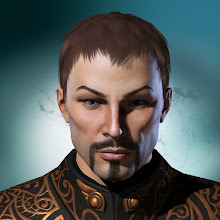Black
then
white are
all I see
in my infancy.
red and yellow then came to be,
reaching out to me,
lets me
see.
There
is
so much
more that beckons me
to look through to these
infinite possibilities.
As below, so above and beyond, I imagine
drawn outside the lines of reason.
Push the envelope. Watch it bend.
Spiral out, keep going...
Spiral out, keep going...
Spiral out, keep going...
Yes, that's a full Fibonacci sequence (up and back down) within that first stanza and a half of one on he second. That's just some of the awesomeness in those lyrics. But beyond that, there's the meaning of the words... 1) we never know enough, and 2) reality is constantly being remade by what we do know.
Yesterday, it struck me that this really is the secret to Eve's success.
Every so often on reddit, you see posts from players returning to the game asking what has changed. And after a few of the responses, you start to see patterns. Rebalances, patches, and new features come and go, changing the equilibrium among fleet concepts and doctrines throughout the gameworld.
Let's consider the addition of T3Ds. Not only did they provide unique roaming options that raised the likelihood of roaming gangs having combat probes and improving the survivability of hard tackle, but they had huge ramifications on the kinds of ships used. They eviscerated variety in faction warfare, but also provided additional fast-moving dps options for roaming gangs. They eliminated the value of an entire class of ships (assault frigates), which called into question the value of frigates in general. Yet, they also provided a means for individual piloting skill - particularly as it centers around shifting modes - to affect the outcome of fights. Very early, it became clear that T3Ds were too powerful, and were nerfed before the final two ever released. More recently, they were banned from small complexes as a result of their overpower. They fundamentally changed the nature, fleet comps, and strategies of that one area of space, and had significant effects elsewhere too.
And that's just one addition.
In a sense, Eve isn't just one game; it's a different game with every rebalance and new ship addition, as only the best representations of each tactic win out. Different patches change ship stats to "rebalance", but in reality, those rebalances are really re-rolls, tossing the fleet metas into upheaval. We don't fly Drakes anymore, we don't fly Maelstroms, and we don't fly Ishtars anymore (as much). Each requires a different way of flying, different doctrines and ship types to counter them, and different support ships. Doctrine changes shift not only what we fly, but how we think.
Consider: when was the last time you flew an autocannon-focused doctrine? Yet Cynabals and Dramiels used to be nigh-untouchable solo ships. The additions of force auxiliaries means that the ships giving reps will not be able to receive them themselves, limiting the survivability of capital logi. This is going to dramatically reshuffle the way fleet fights occur.
Are you playing the same game in June 2016 as you were in June 2012? It may be called Eve Online, but each change to ship types endlessly spirals out, affecting the best-options, second-best options, counters, needed support ships, solo meta that exploits the weaknesses of those doctrines, and requirements of pilots. It's not the same game.
And, oddly, that unpredictability is exactly why it has lasted as long as it has. even a 5% shift in one ship's stats can cause it to no longer be as valuable, forcing innovation and adaptation. The moment you know what you should fly in a situation, it changes.
I find that particularly interesting. To hear tell from the CSM minutes, CCP feels Eve players are predisposed to enjoy tacking dynamic and complex challenges. I'd tend to agree, but even the most complex system can be min/maxed. And once that peak strategy is achieved, interest starts to wane. But when those game aspects are ever-morphing, it forces innovation and adjustment, constantly breaking people out of their comfort zones and easy solutions.
Yes, some players will always get "change fatigue", particularly when they're successful at a specific set of mechanics ("Back in my day, X was fun; now it sucks, and CCP screwed up the game; I'm unsubbing."), but these frustrations are almost always a result of temporal localization - fixing yourself to one time and place and viewing everything that comes after as fouling up that perfect state.
Yet, this same effect draws players to return. With most MMOs, while some mechanics change here or there, the roles and functionality remains largely the same. Yes, things change from time to time, but at its core, Eve relies upon the reactions of players to those mechanics more than any other game. Eve is the ripples, not the pond. And every change brings out the quintessential factor Eve has that other games cannot reproduce... a new reaction.
"Push the envelope. Watch it bend."

Tool, brand leaders in mystifying words linked together in something like the English language.
ReplyDeleteCCP, brand leaders in mystifying mechanics linked together in something like the English language.
I can see the similarities already!